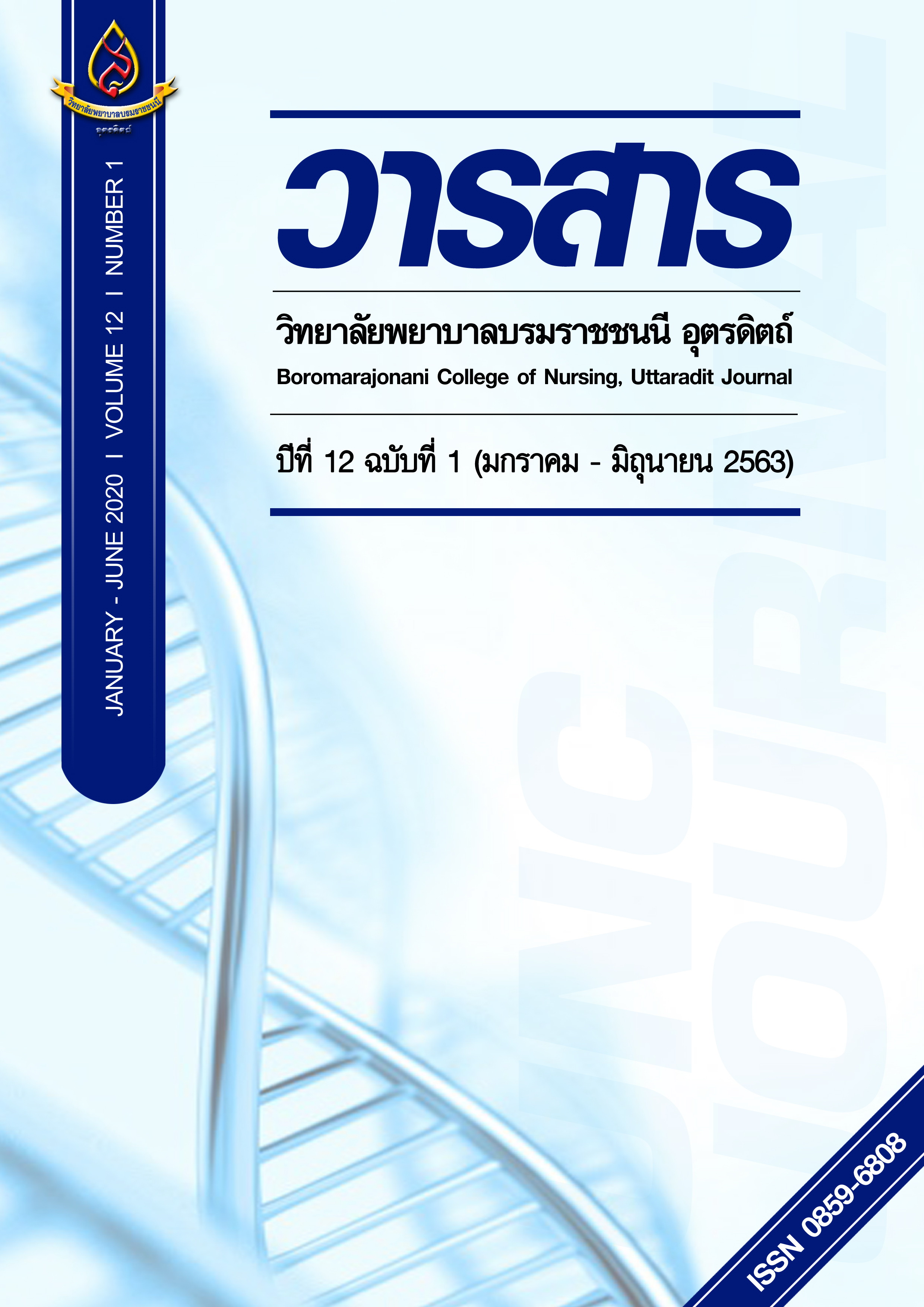ผลของการใช้ชุดกิจกรรมป้องกันโรคสมองเสื่อมต่อการทำงานของสมองของผู้สูงอายุโรคเรื้อรังในชุมชน Development of Dementia Prevention Programs for Older Persons with Chronic Illness in Community
Main Article Content
บทคัดย่อ
การวิจัยครั้งนี้เป็นการวิจัยแบบกึ่งทดลองศึกษาสองกลุ่มวัดผลก่อนและหลังการทดลอง มีวัตถุประสงค์เพื่อเปรียบเทียบการทำงานของสมองระหว่างผู้สูงอายุโรคเรื้อรังในชุมชนที่ได้รับการใช้ชุดกิจกรรมป้องกันโรคสมองเสื่อมกับกลุ่มที่ได้รับการพยาบาลตามปกติ และเปรียบเทียบการทำงานของสมองของผู้สูงอายุโรคเรื้อรังในชุมชนก่อนและหลังการใช้ชุดกิจกรรมเพื่อป้องกันโรคสมองเสื่อม กลุ่มตัวอย่างเป็นผู้สูงอายุที่เจ็บป่วยด้วยโรคเรื้อรัง จำนวน 60 คน เครื่องมือที่ใช้ ได้แก่ แบบบันทึกข้อมูลส่วนบุคคล แบบทดสอบสภาพสมองเบื้องต้นฉบับภาษาไทย MMSE-Thai 2002 และชุดกิจกรรมป้องกันโรคสมองเสื่อม เก็บข้อมูลระหว่างเดือนตุลาคม 2560 – กันยายน 2561 วิเคราะห์ข้อมูลโดยใช้ สถิติความถี่ ร้อยละ สถิติความแปรปรวนทางเดียวแบบวัดซ้ำ และ สถิติ t - test
ผลการวิจัย สรุปได้ดังนี้
1. ผู้สูงอายุโรคเรื้อรังในชุมชนที่ได้รับการใช้ชุดกิจกรรมป้องกันโรคสมองเสื่อมมีคะแนนเฉลี่ยแบบทดสอบสภาพสมองเบื้องต้นฉบับภาษาไทยสูงกว่ากลุ่มผู้สูงอายุที่ได้รับการพยาบาลตามปกติอย่างมีนัยสำคัญทางสถิติที่ระดับ .01 (p<.01)
2. ผู้สูงอายุโรคเรื้อรังในชุมชนหลังได้รับการใช้ชุดกิจกรรมป้องกันโรคสมองเสื่อมในสัปดาห์ที่ 7 และสัปดาห์ที่ 12 มีคะแนนเฉลี่ยแบบทดสอบสภาพสมองเบื้องต้นฉบับภาษาไทยสูงกว่าก่อนใช้ชุดกิจกรรมอย่างมีนัยสำคัญทางสถิติที่ระดับ .01 (p<.01)
Article Details
บทความหรือข้อคิดเห็นใดใดที่ปรากฏในวารสารวิจัยการพยาบาลและวิทยาศาสตร์สุขภาพ เป็นวรรณกรรมของผู้เขียน ซึ่งบรรณาธิการหรือสมาคมศิษย์เก่า ไม่จำเป็นต้องเห็นด้วย และบทความที่ได้รับการตีพิมพ์เผยแพร่ถือเป็นลิขสิทธิ์ของวารสารวิจัยการพยาบาลและวิทยาศาสตร์สุขภาพ
เอกสารอ้างอิง
Aekplakorn, W., Puckcharern, H., Thaikha, K., & Satheannoppakao. (2016). Thai national health examination survey, NHES V. Bangkok: Aksorn Graphic and Design. (in Thai).
Anothaisintawee, T., Thamakaison, S., & Srisuwan, P. (2014). Review of dementia prevention in elderly. (Research report). Bangkok: Health Intervention and Technology Assessment Program. (in Thai).
Department of Medical Services, Ministry of Public Health. (2015). Guide book for screening and evaluating the elderly. Bangkok: WVO Officer of Printing Mill. (in Thai).
Erickson, K.I., Hillman, C.H., Kramer, A.F. (2015). Physical activity, brain, and cognition. Current Opinion in Behavioral Sciences, 4, 27–32. doi:10.1016/j.cobeha.2015.01.005.
Gomez-Pinilla, F., Hillman, C. (2013). The influence of exercise on cognitive abilities. Comprehensive Physiology. 3(1), 403–428. doi:10.1002/cphy.c110063. PMC 3951958. PMID 23720292.
Institute of Geriatric Medicine, Department of Medical Services, Ministry of Public Health. (2018). Health and social protection system for dementia people with long term care needs in rural community. (in Thai).
Institute of Geriatric Medicine, Department of Medical Services, Ministry of Public Health. (2018). Pratice guidelines of comprehensive care management for older persons with dementia. Bangkok: Cyberprint Group. (in Thai).
K Ritchie., I Carrie`re., C W Ritchie., C Berr., S Artero., M-L Ancelin. (2010). Designing prevention programmes to reduce incidence of dementia: prospective cohort study of modifiable risk factors. British Medical Journal, 2010, 341,c3885 doi:10.1136/bmj.c3885.
Kelly, M.E., Loughrey. D., Lawlor, B. A., Robertson, I.H., Walsh, C., & Brennan, S. (2014). The impact of exercise onthe cognitive functioning of healthy older adults: a systematic review and meta-analysis. Ageing Research Review, 16, 12–31.
Lautenschlager, N., Cox, K., Cyarto, E.V. (2012). The influence of exercise on brain aging and dementia. Biochimica et Biophysica Acta. 1822(3), 478-481.
Larson, E., Wang, L., Bowen, J., McCormick, W., Teri, L., Crane. P., Kulull, W. (2006). Exercise is associated with reduced risk for incident dementia among Persons 65 years of age and older. Annals of Internal Medicine, 144(2), 73-81.
Muangpaisan, W. (2013). Dementia: prevention, assessment and care. Bangkok: Parbpim Printing. (in Thai).
Office of The National Economic and Social Development Board. (2013). Population projections for Thailand 2010-2040. Bangkok: October print Press. (in Thai).
Polit, D., & Beck, C. (2014). Essentials of nursing research: appraising evidence for nursing practice. (8 th ed.). Philadelphia: Lippincott Williams & Wilkins.
Prasat Neurological Institute. (2014). Clinical practice guideline: Dementia. Bangkok: Thana place and graphic. (in Thai).
Rakesh, G., Szabo, S.T., Alexopoulos, G.S., Zannas, A.S. (2017). Strategies for dementia prevention: latest evidence and implications. Therapeutic Advances in Chronic Disease. 8(8-9), 121-136.
Ramking, N., & Soonthornchaiya, R., & Vuthiarpa, S. (2018). The effect of a cognitive stimulation program on the cognitive function of older adults with mild cognitive impairment. Journal of Nursing and Health Care, 36(2), 114-22.
Richard, E., Andrieu, S., Solomon, A., et al. (2012). Methodology challenges in designing dementia prevention trials-the European dementia prevention initiative. (EDPI). Journal of the Neurological Sciences, 322(1-2), 64-70.
Sofi, F., Valecchi, D., Bacci D., Abbate R., Gensini. G F., Casini, A., Macchi, C. (2010). Physical activity and risk of cognitive decline: A meta-analysis pf Prospective Studies. Journal of Internal Medicine, 269(1). doi: 10.1111/j.1365-2796.2010.02281.
Sundstrom, A., Westerlund, O., Kotyrlo, E. (2016). Marital status and risk of dementia:a nationwide population-based prospective study from Sweden. BMJ Open 2016;6:e008565. doi:10.1136/bmjopen-2015-008565.
Trakulsithichoke, S., & Suwan, A. (2016). Effects of cognitive stimulation program on mental status and activities of daily living among activities of daily living among elderlies who are at risk of or having dementia. Thai Red Cross Nursing Journal, 9(2), 145-58. (in Thai)
World Health Organization. (2017). Global action plan on the public health response to dementia 2017-2025. Geneva: WHO Document Production Services; 2017.


